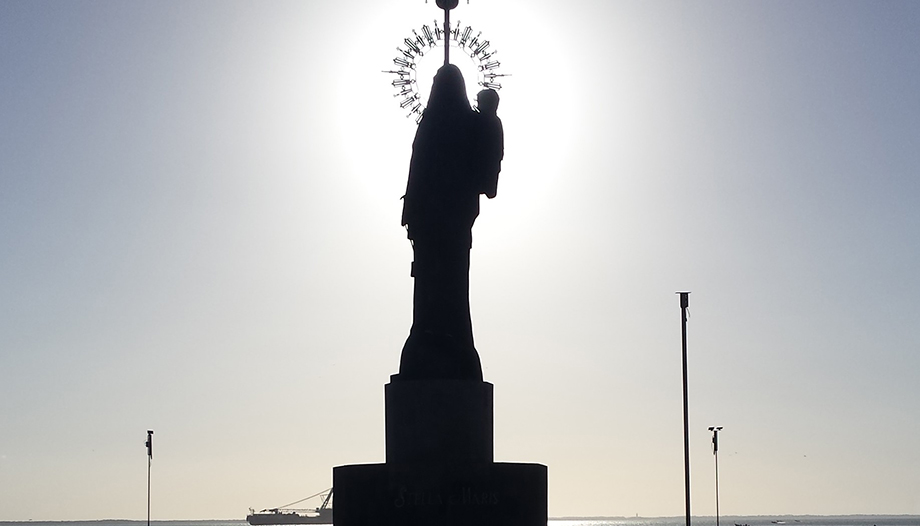It was precisely the bishop of Tui-Vigo, promoter of the Stella Maris in Spain, Monsignor Luis Quinteiro, who last weekend presided over the Offering of the sea at the Votive Temple of PanxónThe "Virgen del Carmen", a tribute of faith and devotion that, every year, the four navies -the Navy, the merchant fleet, the fishing fleet and the sporting fleet- pay to the Virgin of Carmen. You can see here at the end the singing of the Salve Marinera and the Offering, after the celebration of the Eucharist.
On this occasion, the Centro Stella Maris de Atención al Marino chose Edelmiro Ulloa, new manager of the Cooperativa de Armadores de Vigo (ARVI), as the offerer on behalf of the entire fishing fleet, to which it corresponded to make the offering in this year marked by the Covid-19. Edelmiro Ulloa thanked the Virgin for her presence as "permanent light and guide to port for our sailors, joy in the reunion of our people and support in their absence, her company in the loneliness that sometimes entails life on board, comfort for those who suffer the bitterness of the definitive loss".
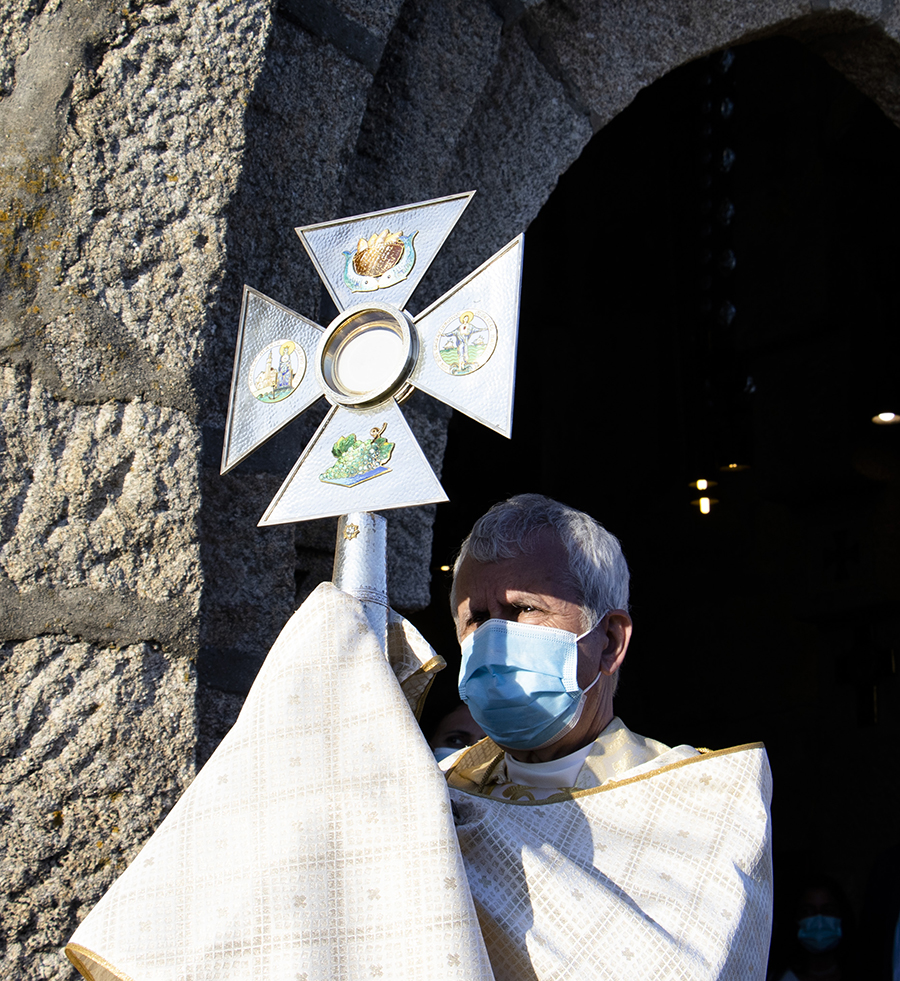
As usual, Bishop Luis Quinteiro responded to the offering by exhorting all the faithful to value, both socially and spiritually, the world of the sea, which "has a decisive importance in our working, economic and social life. Fishing shapes societies that have an incredible strength in their customs and traditions, in their beliefs and in their solidarity, becoming an example for the whole society".
Finally, Bishop Luis Quinteiro blessed the seas from the door of the church with the Blessed Sacrament, which traveled through the naves with the faithful seated in their places, thus complying with the recommendations of the Pastoral Vicariate for places of worship. The Offering of the Sea, which has been celebrated in Panxón since 1939, has become an opportunity to revalue the role of the sailors and to make visible the serious problems affecting their families.
Paths of dignity and justice
In keeping with the theme of the Day, the bishop of Tui-Vigo and promoter of Stella Maris (Apostleship of the Sea) emphasized that "in these difficult times for everyone, and in a very special way for seafarers, the Apostleship of the Sea wants to be close to each of the men and women of the sea to tell you that you are not alone, that you are not forgotten". The prelate recalled that Stella Maris "fulfilled 100 years with all of youand all of us who make up this great family want you to continue to feel the heart and commitment of the Church close to you. We will continue to row together on the paths of dignity and justice, freedom and solidarity".
To this end, "the Church is present in a very close way in the sea parishes, in the sea ports, attending to the sailors and their families, visiting the ships when they arrive with sailors who do not know the language and who need urgent things and the company of friendly people. Stella Maris, the Apostleship of the Sea, wants to promote every day the presence of the Church in every port, in every seafaring town, in all our parishes near the sea, because the light of faith is the best way to fight for the dignity of life of our people of the sea", summarized Bishop Quinteiro.
The largest parish in Barcelona
It is possible that some of those who read these lines are not aware of the evangelization and apostolate of Stella Maris with the people of the sea. Consequently, here are a few brushstrokes today, feast of the Patroness, Our Lady of Mount Carmel. Ricardo Rodriguez-Martos (Barcelona) and Mariel Larriba (Vigo) spoke with Omnes.
At the end of June, the Episcopal Subcommission for Migration and Human Mobility of the Spanish Episcopal Conference (CEE), presented the book The Apostleship of the Sea, a pastoral ministry of the Church going out to sea (EDICE), authored by Ricardo Rodríguez-Martos Dauer (Barcelona, 1948), former captain of the Merchant Marine and professor at the Nautical Faculty of Barcelona.
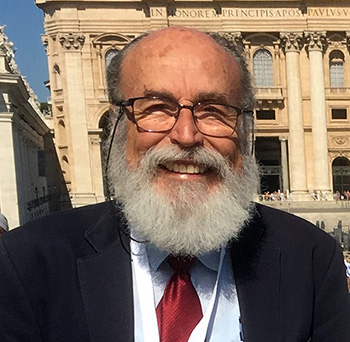
Ricardo Rodriguez-Martos has been the diocesan delegate of the Apostleship of the Sea of the Archbishopric of Barcelona since 1983, when he was ordained deacon by Cardinal Narcis Jubany, who put him in charge of the Apostleship of the Sea in Barcelona. He has been piloting the activity of Stella Maris in the Port of Barcelona for almost 40 years, is married, and has 3 children and 8 grandchildren. An institution.
In the presentation of the book, Rodriguez-Martos referred at the end "to the thousands of people involved in the Port of Barcelona, to the thousands of people who spend a year aboard ships, and to the pastoral activity that takes place in the announcement of the faith (celebrations, blessing of ships ̶ a very seafaring tradition ̶ , burials, weddings, Masses, an important pastoral activity".
And he told the following anecdote: "taking all this together, in the last assembly we had before the pandemic, the Cardinal of Barcelona, Archbishop Juan José Omella, said: "After what I have heard, I come to the conclusion that Stella Maris is the largest parish in Barcelona".
Then, referring to some of the ideas expressed in the presentation, he said: "All these are elements of the Church going out, and I believe that the Apostleship of the Sea, Stella Maris, in whatever port it works, must try to follow this path. To get involved with gestures and works in the daily life of the ports and ships".
The Catalan author also explained how the initiative to write a book on the Apostleship of the Sea, Stella Maris, of the Church came about: "The idea for this work came about in the following way. A few years ago, at an assembly in Barcelona where we presented the annual report, the then auxiliary bishop of Barcelona, Sebastiá Taltavull, now bishop of Palma de Mallorca, presided over the assembly. After listening to the different interventions where we explained what our activity consisted of, he said: 'What you are doing is exactly the Church going out'.
Since then, Rodriguez-Martos said, "a concern grew in me to deepen this concept. It seemed to me that all the activity carried out in the Apostleship of the Sea was worthwhile to focus it in the light of the Magisterium, of the biblical foundations, of pastoral work, so that it could really be enriched by this reflection and help to progress and move forward. I began to study the Evangelii gaudiumand I became enthusiastic. I am an enthusiast of Evangelii Gaudium and the documents of Pope Francis".
A Pope of whom the veteran seafarer, for so many years in evangelizing tasks, highlights this phrase, to cite an example: "I prefer a Church that is battered and stained by going out into the street, rather than a Church that is sick because of enclosure and the comfort of clinging to its own comforts. This is very inspiring. To go to the peripheries, to get involved with works and gestures, this is indispensable in the Apostleship of the Sea".
Images of Church on the move
Rodriguez-Martos speaks of images that he considers "clarifying of the Church going out" in Stella Maris: the ship visitor who leaves his comfort at home to attend to the crews; the well-known van with large letters STELLA MARIS or the meetings in the port. They are "images of the Church going out. Like when the Church sits down to take part in work groups.
"We are there to represent the social sustainability of seafarers. We must not forget that economic and environmental sustainability are included in Laudato si'. Getting involved in that is also the work of the Church. The important thing is, for me, to be like Stella Maris and to contribute what we want to contribute. And we are listened to. The Church has, in the social and civil sphere, the right and the duty to make itself heard. Sitting as one more. And the Church shares everyone's problems. It is a very important facet of the Church going out".
In the Port of Vigo
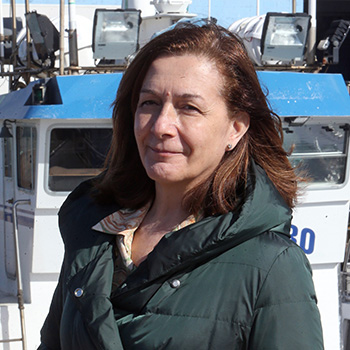
Mariel Larriba Leira is the other side of the Rodriguez-Martos coin. But only in chronology, because she took over a few months ago. She is the delegate of the Apostleship of the Sea for the diocese of Tui-Vigo since January. Her predecessors died last year, they were very old. And Don Luis [Bishop of Tui-Vigo] told me: it's your turn. It is an honor. The people who led the Apostleship of the Sea in these decades were people of consecrated life, who were dedicated to caring for the orphans of seafarers, and to all the management of the construction and maintenance of the votive temple of the Sea, which was built by the architect Palacios, and the school for orphans".
"I have been in contact with the world of the sea for years," explains Mariel Larriba. "I have been in charge of fishing issues, I have been in the elaboration of the last strategic plan of the Port of Vigo. I have been spokesperson for Fisheries in the Senate, I have had to take important legislative initiatives. One of them has been the claim of the seafarer's vote, "a matter that is unresolved". We ask you to tell us about it.
"I remember in 2011, in the Senate, I was senator for the province of Pontevedra, and we had presented a report: in the fishing fleet, registered, there were about 16,000 fishermen, of which barely two hundred voted. And they were a very high average. The sailors have a very limited right to vote, they do not vote, they cannot vote, because they are fishing. I collided head-on with the Central Electoral Board. In Spain we are still dragging this along, we are very guaranteeing, and it has to be the person who puts the ballot in the ballot box. There is no proxy voting, no virtual voting, no postal voting... In other countries, yes".
Profile of Stella Maris
"Stella Maris is a worldwide organization, which has been working on behalf of the seafarer for more than a hundred years. We depend on the Dicastery for Human Development, and we are divided in the world by geographical areas. There are more than 300 Stella Maris centers. Spain is a coastal country, and we are divided into two areas, one that includes all the ports of the Mediterranean and the Canary Islands; and what we can call the Cantabrian and Atlantic coast we are coordinated by the oldest, which is Stella Maris UK. Stella Maris was born in Glasgow, and it is Stella Maris UK who coordinates us".
Mariel Larriba continues: "I have come across this tremendous network, and also integrated into organizations of a wider spectrum. In Stella Maris we are the centers of the Catholic Church, but as this Apostleship of the Sea developed a lot in England, in the Anglican Church, as in other Christian confessions, there is an international association, ICMA, where we are the centers of help, of welcome to the seafarers all over the world, of all the Christian churches. There is an extraordinary ecumenical atmosphere, a total collaboration".
Vigo: the challenge of digitalization
The Stella Maris center in Vigo has been inside the port for more than 30 years, in the offices, and the new Stella Maris delegate speaks of two challenges in "the work of welcoming and accompanying seafarers". The first is digitalization.
"The largest number of sailors we see circulating on the docks are those of the fishing fleet, because in the commercial navy they hardly get off the ships, or they go down for a few hours, load and leave. Each port is a world. For example, our port is not for bulk ships, which take several days to load, it is mainly for containerized goods. That's why we have to anticipate. And one of my challenges is to reach these crews digitally, through the internet, to be able to serve them before they arrive at port, to optimize the time they are on land. Empathy is easy when there is physical presence. When there is no physical presence, it is more difficult. For this reason, we have contacted the San Camilo Listening Center in Madrid to attend these crews by telephone".
Added to this is the fact that "the crews we have now are multicultural. That is also why the challenge of digitalization. In other countries, they are well advanced. In Spain we have to get our act together to reach them virtually. The pandemic has made it impossible for us to reach the crews. Their isolation has increased tremendously.
As for working conditions in the fishing fleet, "they have been so hard and so unfair that there are hardly any Spaniards who want to work at sea," says Mariel Larriba. "Except for commanders and officers, almost no one in the crews is Spanish. In the case of the fishing fleet, it is the African coastal countries that are feeding our fleet: Senegalese, Mauritanians, Moroccans. The coexistence in these crews where they do not speak the same language, nor are they of the same culture, must be extremely difficult. The technologies, according to the data we are obtaining, allow them to use their tablets or whatever after work, and they become more and more isolated, and the psychological problems increase. The conditions of loneliness are enormous.
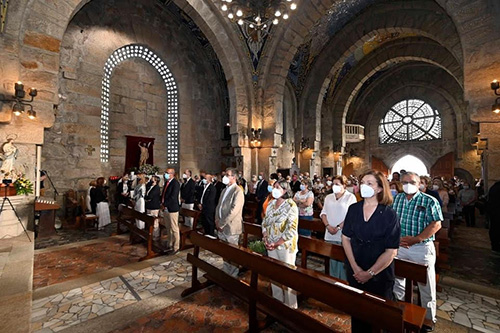
The challenge of the Church on the move
In profiles similar to those expressed above by Rodriguez-Martos, Mariel Larriba refers "to another challenge: the concept of the Church as an outlet, which applies one hundred percent to the port area, because almost all maritime-port cities live with their backs to the sea. Here in Vigo, we are an elongated city, close to the coast, and the port is the whole facade of the city facing the sea, it was a part of which the city had no idea of what was going on beyond".
"We are not a political movement or a trade union movement, but it is a charitable and social work of the Church, helping people. When we speak in terms of sustainability, we are thinking of environmental sustainability. And social sustainability is thought of in socioeconomic terms only. We, who are part of the Port Council, and we are in different working groups, we realize that in the meetings they talk about tons fished, etc., but the word crew member, the person, does not come up in the whole meeting. People are not, in general, the object of attention. There is only a concern for their professional training".
Social and human sustainability
"But if they live far from their families, if they are looking for family reunification, if they have not seen their families for months, if they happen to be hospitalized here because they have had appendicitis, if they are in the hospital alone, if they have been arrested because they are carrying some illegal cargo and end up in prison, they are in prison by themselves, seven or nine thousand kilometers away from their homes. These human aspects are not covered," adds Mariel Larriba.
In his opinion, "the special sensitivity towards this group, because their field of work is unique, that closeness, that specificity, is being lost, and the coverage is increasingly poor. We have the opportunity to be that voice of humanity in the maritime and port area. I believe that Stella Maris has a great opportunity to do that work".
That expression, "voice of humanity", reflects a living reality. We concluded by talking about the Virgin of Mount Carmel. "In the maritime sphere there is a very great devotion to the Virgin of Mount Carmel. And the ports are also spaces for evangelization. There are many sailors who have no spiritual formation of any kind, beyond the four or five rites they have experienced in their countries of origin".
"In the port area there is no oratory or chapel. There are priests, deacons, who work at Stella Maris. I would love to see a small chapel opened in the port of Vigo. In the port of Almeria, which had a mosque, the delegate of Stella Maris managed to open an oratory," adds the Vigo delegate. "I would like to convey this interest in a necessary social and human sustainability, which Stella Maris has been doing, and can develop it much more".


